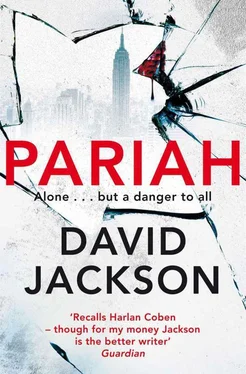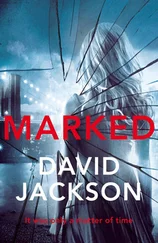David Jackson - Pariah
Здесь есть возможность читать онлайн «David Jackson - Pariah» весь текст электронной книги совершенно бесплатно (целиком полную версию без сокращений). В некоторых случаях можно слушать аудио, скачать через торрент в формате fb2 и присутствует краткое содержание. Год выпуска: 2011, ISBN: 2011, Издательство: Macmillan Publishers UK, Жанр: Триллер, на английском языке. Описание произведения, (предисловие) а так же отзывы посетителей доступны на портале библиотеки ЛибКат.
- Название:Pariah
- Автор:
- Издательство:Macmillan Publishers UK
- Жанр:
- Год:2011
- ISBN:9780230759091
- Рейтинг книги:3 / 5. Голосов: 1
-
Избранное:Добавить в избранное
- Отзывы:
-
Ваша оценка:
- 60
- 1
- 2
- 3
- 4
- 5
Pariah: краткое содержание, описание и аннотация
Предлагаем к чтению аннотацию, описание, краткое содержание или предисловие (зависит от того, что написал сам автор книги «Pariah»). Если вы не нашли необходимую информацию о книге — напишите в комментариях, мы постараемся отыскать её.
Pariah — читать онлайн бесплатно полную книгу (весь текст) целиком
Ниже представлен текст книги, разбитый по страницам. Система сохранения места последней прочитанной страницы, позволяет с удобством читать онлайн бесплатно книгу «Pariah», без необходимости каждый раз заново искать на чём Вы остановились. Поставьте закладку, и сможете в любой момент перейти на страницу, на которой закончили чтение.
Интервал:
Закладка:
Reaching down to Paulson, he takes his free hand and shakes it firmly.
He’s out of time.
He’s pacing up and down in Spinner’s apartment, trying to think, and all he can hear is a tiny voice telling him he has no more time.
Bartok has found him once, he’ll find him again. And next time he won’t miss. In a period of less than one day, Doyle has twice washed the blood of others from his hands. It’s only a matter of time before they’re covered in his own.
The cops will be searching for him too. They’ll want to know why he was talking to IAB, and why he booked the scene when Paulson was shot. If they haven’t done so already, they’ll check the hotel and discover that he’s abandoned it and gone into hiding. At some point, either the cops or Bartok will have the presence of mind to look here, and then it’ll be too late for him to do anything.
So concentrate, goddamnit!
Okay, what do we have? Somehow Kurt Bartok found out the identity of the guy who’s been terrorizing me. He gets Sonny Rocca to approach the killer with an offer. Bartok will keep his identity under wraps in return for. .
For what?
What use is this guy to Bartok?
Doyle knows the answer. It’s something he should have realized a long time ago, but even now he finds it hard to accept.
Bartok was just doing what he always did. It was second nature to him. The value of the killer to Bartok was his information.
Because the killer is a cop.
Much as Doyle doesn’t want to believe it, it’s the only glue that can hold all the pieces together. Bartok’s commodity was information, most of which came from cops. He already had at least one Eighth Precinct cop in his pocket — Paulson confirmed that much.
Suppose the crooked cop finds something out about another member of service. Not necessarily that he’s a killer — this is probably way before Parlatti is murdered. Just a juicy tidbit of information that maybe could be used as leverage. Dutifully, the dirty cop passes it on to his unofficial employer, Kurt Bartok, and Bartok files it away in his vast mental storehouse. Only later, when the killings begin, is Bartok able to slot the data into the right place and see it for what it really is: a pointer to a man who is slaughtering and persecuting his own brothers.
What Bartok has now is the perfect opportunity for turning another cop. It’s not something he’s going to ignore. So he sends Rocca out to talk to the cop, to make him that offer.
Only the cop doesn’t fall for it. He bounces Rocca back with instructions to Bartok to go fuck himself.
Now Bartok doesn’t know what to do. Nobody’s ever called his bluff like this before, but he doesn’t want to give up this chance of gaining another source of his precious data.
Which is where Spinner comes in.
To Bartok, Spinner is just a pawn. Expendable. His only use is to put pressure on the cop. Bartok calls Spinner in to give him the name, but he lets the cop know about it, hoping that this time he’ll cave in.
Only he doesn’t. What he does instead is to track down Spinner and eliminate him. Whether Spinner actually learned the name or not is irrelevant. The point is that the killer believed he knew it.
And still Bartok doesn’t give up. He sends Rocca back yet again, this time with the message that he’s going to hand the killer’s name directly to the victimized cop, Doyle. It seems a win-win situation to Bartok, because he gets either the killer or Doyle as a new addition to his stable.
But the killer is always just that one step ahead. Being a cop, he may already know about the bad relations between Rocca and Bartok. He’s also had several opportunities to sound Rocca out about his employment prospects. So he makes Rocca a counteroffer, and it’s bye-bye Bartok.
Doyle stops pacing. He puts his hands over his eyes, the enormity of the truth shocking him to his core.
A fellow cop! Jesus Christ.
He wants to look for reasons to reject it as fact, to find alternatives, but he knows that nothing else will fit.
It explains so much: how the killer knew Doyle was at the boxing gym, and which was his car; how he knows Doyle’s wife and child, his address, the car that Rachel drives; how he knew Joe’s pool-night routine so well.
And there’s something else, too. When this guy phoned Rachel, pretending he was a doctor at Bellevue, he put on a fake Indian accent. The only reason for doing that is because there was a danger of Rachel recognizing his voice.
This isn’t just any cop.
This is a cop close to home.
So who?
And why is he doing this to me?
Which cops have I hurt so badly that he would go to such lengths to get back at me?
Marino? Sure, he hates my guts, but would even he stoop to this? Killing other cops just to isolate me? What kind of perverted justice is that?
Doyle collapses onto a chair, his head still in his hands. Around him are the noises of a building come to life: televisions, slamming doors, footsteps in the hallway, barking dogs, crying children. But he is oblivious to them all. He doesn’t move for a long time. He just sits and thinks, replaying recent conversations a thousand times each in his head. Looking for signs. Looking for hate. Looking for reasons.
And when his brain can take no more, he experiences utter despair. Sadness overwhelms him.
Not because the answers evade him.
But because they come to him. In a form more shocking than he would have believed possible.
He has work to do. He has people he must speak to.
If he is wrong, he may be putting their lives at risk.
That’s if he can stay alive long enough to get to them.
TWENTY-EIGHT
The house is situated near the New Croton Reservoir in Westchester County, about twenty-two miles north of the city. The body of water used to be known as Croton Lake, which, back in the mid-nineteenth century, fed a distributing reservoir located in mid-town Manhattan. Today’s users of the New York Public Library on Fifth Avenue might be surprised to learn that, a century and a half earlier, their ancestors were promenading above them and delighting in the view of the moonlight bouncing off glassy waters.
The property is a huge two-story affair in white clapboard, with not a neighboring building in sight. A perfect vertical line of chimney smoke betrays the stillness of the crisp air. Christmas lights are strung like icicles along the eaves, and a ghostly plastic snowman looks out from a window, a friendly smile on its big moon-like face. Somewhere in the many acres of woodland beyond the rear of the property, an animal or bird screeches. It’s a quiet, peaceful place, so different from the frenetic bustle of the city.
Doyle steps onto the wooden porch, sucks in an icy breath that stings his windpipe, then thumbs the doorbell.
A light comes on inside, and a shadow looms through the glass pane of the door. The door opens, and a woman peers at him through the porch screen. She seems surprised — shocked even.
‘Cal!’ she says.
Doyle wishes he could find a smile for her, but he can’t.
‘Hello, Nadine,’ he says.
She leads him through a paneled hallway. Ornamental plates on the walls. A pendulum clock beating out the house’s pulse. A tastefully decorated Christmas tree in one corner.
When he shambles into the light, she sees what a wreck he is.
‘My God, Cal. What happened? Did you take up boxing again?’
‘Yeah. Only now I fight three at once, just to make it a challenge. Is Mo in?’
‘Not yet. It’s just another lonely night.’
Another lonely night. She could have been saying, Oh, for some male company to keep me warm on this bitter winter night. But this is Nadine the Siren. She makes men read such things into her words.
Читать дальшеИнтервал:
Закладка:
Похожие книги на «Pariah»
Представляем Вашему вниманию похожие книги на «Pariah» списком для выбора. Мы отобрали схожую по названию и смыслу литературу в надежде предоставить читателям больше вариантов отыскать новые, интересные, ещё непрочитанные произведения.
Обсуждение, отзывы о книге «Pariah» и просто собственные мнения читателей. Оставьте ваши комментарии, напишите, что Вы думаете о произведении, его смысле или главных героях. Укажите что конкретно понравилось, а что нет, и почему Вы так считаете.



![David Jagusson - Devot & Anal [Hardcore BDSM]](/books/485905/david-jagusson-devot-anal-hardcore-bdsm-thumb.webp)
![David Jagusson - Fesselspiele mit Meister David [Hardcore BDSM]](/books/486693/david-jagusson-fesselspiele-mit-meister-david-har-thumb.webp)

![David Jagusson - Fesselspiele mit Kassandra [Hardcore BDSM]](/books/488888/david-jagusson-fesselspiele-mit-kassandra-hardcor-thumb.webp)
![David Jagusson - Danas uneingeschränkter Herrscher [BDSM]](/books/489141/david-jagusson-danas-uneingeschrankter-herrscher-thumb.webp)

![David Jagusson - Fiona wird durchgefickt [BDSM]](/books/491106/david-jagusson-fiona-wird-durchgefickt-bdsm-thumb.webp)
![David Jagusson - Sexgierig & Devot [Hardcore BDSM]](/books/491232/david-jagusson-sexgierig-devot-hardcore-bdsm-thumb.webp)

![David Jagusson - Sara wird devot [Hardcore BDSM]](/books/501483/david-jagusson-sara-wird-devot-hardcore-bdsm-thumb.webp)